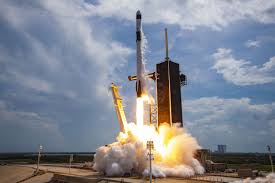Introduction: The Dawn of Interplanetary Ambition
In the annals of human history, the quest for exploration has always been a defining trait. From the voyages of Christopher Columbus to the expeditions of Lewis and Clark, humanity’s spirit of adventure has propelled us beyond our known boundaries. Today, this spirit is not confined to Earth; it extends into the cosmos, with Mars as our next frontier. The modern space race isn’t just about national pride or scientific discovery; it’s about survival, expansion, and the dream of colonising another planet. This article delves into the technological marvels, like reusable rockets, that are making this dream a tangible reality.
The Economics of Space Travel: Reusable Rockets
The cornerstone of modern space exploration is the development of reusable rocket technology. Traditional rockets were single-use, which made space travel exorbitantly expensive. However, with the advent of companies like SpaceX, led by Elon Musk, the paradigm has shifted. Reusable rockets, capable of returning to Earth after delivering their payload, drastically reduce costs. For instance, SpaceX’s Falcon 9 can reach speeds of approximately 15,000 km/h, deliver satellites or supplies into orbit, and then land back on Earth, ready for another mission. This cycle not only cuts down the cost per launch but also accelerates the frequency of space missions, making Mars colonisation more feasible.
According to recent studies, the cost of launching a kilogram into low Earth orbit has decreased from around $10,000 to about $1,500 thanks to reusable technology. This economic revolution in space travel is pivotal for the sustained efforts required to establish a human presence on Mars.
Rocket Lab: New Zealand’s Contribution to the Space Race
While SpaceX garners much of the global spotlight, New Zealand’s Rocket Lab is making significant strides in the space industry. Founded by Peter Beck, Rocket Lab has become a beacon of innovation, launching small satellites into orbit with their Electron rocket. This Kiwi company embodies New Zealand’s historical spirit of adventure, reminiscent of the explorers like Abel Tasman who first charted these islands. Rocket Lab’s success is not just a national pride but a testament to how smaller nations can contribute significantly to global space ambitions.
Rocket Lab’s Electron rocket, although smaller in payload capacity compared to SpaceX’s offerings, plays a crucial role in the burgeoning small satellite market, which is vital for communication, Earth observation, and scientific research. Their commitment to reusability is evident in their development of the Rutherford engine, which uses electric pumps, making it more efficient and less costly to produce.
The Speed of Progress: Achieving 15,000 km/h
Reaching speeds of 15,000 km/h is no small feat. This velocity is necessary to escape Earth’s gravitational pull and enter orbit. The ability of rockets like the Falcon 9 to achieve this speed, deliver a payload, and return safely is a technological marvel. It involves precise engineering to manage the stresses of launch, the vacuum of space, and the intense heat of re-entry. This capability not only showcases human ingenuity but also sets the stage for regular, reliable trips to Mars, where similar speeds are required for interplanetary travel.
Social Media and Public Engagement
The space race today is not just fought in labs and launch pads but also on social media platforms. Companies like SpaceX and Rocket Lab actively engage with the public through platforms like Twitter and Instagram, sharing live updates, behind-the-scenes looks, and educational content. Here are some ways to follow the journey:
Conclusion: The Future of Mars Colonisation
As we stand on the brink of this new era, the technology to colonise Mars is rapidly evolving. Reusable rockets are not just a technological advancement; they are the economic backbone of our space ambitions. With companies like Rocket Lab contributing from the edges of the Earth, and the spirit of adventure that has always driven New Zealand, we are closer than ever to making Mars our second home. The journey is long, filled with challenges, but the path is being laid with each successful launch, each returned rocket, and each public engagement on social media.
CONTRIBUTE
Have stories, yarns, mad scoops, or community news to share. We often pay for awesome content and life shattering stories. What have you witnessed?